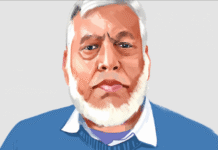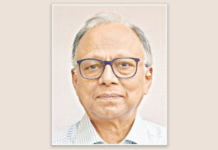 Faruque Ahmed
Faruque AhmedA very highly tense political situation is unfolding in the country. Former president H M Ershad, who joined the so-called ‘all party’ government of the ruling party Awami League and three other left parties two weeks ago to help Prime Minister Sheikh Hasina to hold a unilateral election has stirred the situation once again.
He had agreed to play the role of a loyal opposition to replace BNP in the polls but suddenly he unlocked the dramatic shift on Tuesday by announcing that his party will not take part in the polls. It is not yet clear what prompted him to pull out from the game of continuance but it caused a lot of excitement to the nation. Ershad has asked the party men on Wednesday to withdraw the nomination papers that they have already submitted to take part in the polls and moreover he has asked the five ministers and one adviser of his party in the cabinet to resign.
The announcement has in fact rocked the very foundation of Sheikh Hasina’s so-called all-party government, which is unconstitutional, and her plan to hold the next election using Jatiya Party as a replacement for major opposition BNP and its 18-party allies.
But the Prime Minister has said the departure of Ershad is not the final act as he often stages such somersault. Moreover the government will not budge from its election plan. People are having a sharp eye on Jatiya Party ministers and only if they have resigned, Ershad’s announcement of the withdrawal from the government will be treated as a credible move. There is a real chance of a split in the party.
Following Ershad’s announcement, when the government leaders were busy in shock management, visiting Indian Foreign Secretary Sujatha Singh tried to convince Ershad to return to the government and she used all the tricks breaking the diplomatic norms including the Jamaat phobia in Bangladesh politics. But Ershad himself told reporters later that he has told Ms Singh that Sheikh Hasina must be blamed if it ever happens.
Fresh political bargain
However, many people can’t trust former dictator Ershad. They hold the view that it may be part of a fresh political bargain, he may be asking a bigger price in terms of uncontested seats or otherwise holding the government critically hostage at this moment.
The country is meanwhile, reeling under non-stop blockade programmes over the past two weeks enforced by BNP-led alliance with wider support of other political parties outside the alliance to force the government to stop the unilateral election and arrange holding of a free, fair and credible polls under a non-party caretaker administration.
In fact the country is totally cut off from the capital Dhaka for the last two weeks as the major railway and highway communications remained snapped off due to the blockade programmes.
Angry people are attacking railway lines torching express trains and removing tracks causing frequent fatal accidents. The country’s business life line with Chittagong port and northern districts has remained cut off.
Loading and unloading of cargoes at sea ports remained suspended as people can’t move out imports to inland destinations and make export shipments. The movement of agricultural produce is also facing serious troubles resulting in the skyrocketing of prices of vegetables.
Meanwhile several dozens innocent people lost lives in blockade related violence and torching of vehicles. A growing fear of more such violence is on the rise as people at places are mounting attacks on police stations, torching election offices and homes of ministers and election candidates.
A total anarchy is at work in cities and across the country giving the look that the government has no more control over the situation outside the capital. However, the government remains adamant to hold the January 5 election sidetracking the major opposition. Senior Awami League leaders discussed party strategy over the past two days to recast the election strategy and how to break the opposition enforced blockade programmes.
Contrary to it, BNP has said they would enforce the third spate of blockade again from Saturday and go for tougher action to force the government to postpone the election schedule. They termed the government’s unilateral move to hold the election as a ploy to go back to one-party rule.
Now questions have been raised as to what prompted Jatiya Party chief HM Ershad to pull out from the election time government in two weeks time. He had said earlier that if he joins the election without participation of all parties, people would term him a betrayer at this old age and spit on his face.
And yet he joined the polls changing the words and deeds. He speaks again denouncing what he spoke over the past two weeks and who knows what comes next. Nobody trusts him — be he a friend or a foe.
Ershad’s volte-face
Political observers have different views on Ershad’s volte-face to the government.
He may have been hurt by the ruling party’s announcement of candidates on 297 seats which means JP candidates were to fight the ruling party men at all places; in that case they will have only little chance to win fighting from an uneven election.
Ershad remembers that during last election, Awami League had promised 46 seats to JP candidates but later 17 rival candidates from the party came out to contest the polls as independent and Awami League did not stop them.
They later won the polls leaving only 29 seats for JP candidates to win. They had also promised to elect him president that did not later happen.
Ershad has complained that 35 candidates of his party could not file nominations because of haste and a request to extend the time for submission of those nominations were turned down. It means ruling party candidates will become MPs from these seat uncontested as six of them have already become MP elect uncontested from different places because the ruling party did not allow others to file nominations in those seats.
Status of companions
It appears that the election is only for Awami League alone and JP has been reduced to the status of companions in a bridal party. Ershad may also be using the U-turn strategy to protest the government failure to withdraw cases against him as it may have promised. The government used these cases over the past five years to keep him in submission although it had withdrawn over 7,000 cases giving freedom to party leaders and cadres.
Ershad may have also come under intense pressure from Kazi Zafar Ahmed’s move to run a parallel JP challenging Ershaad’s leadership. He could clearly see that the grassroots may go with Kazi Zafar and his candidates may even face attacks from local JP party leaders and workers at a time when the ruling party is not even allowing enough seats on tacitly uncontested arrangements.
Working for govt?
There is yet another dimension. Many people are questioning whether Ershad is working for the government to stop the polls and declare the rule of emergency in the country. Reports said Prime Minister Sheikh Hasina has already briefed the army chief and we don’t know what is going to happen over the next few days.
The nation is at crossroads with huge risks to democracy if the political leaders do not come to an understanding to restore peace and normal working condition in the country. UN Secretary General’s special envoy Oscar Fernandez Taranco is scheduled to visit Dhaka on Sunday to renew his past efforts to solve the polls-time government issue.
Meanwhile, the US and European leaders alerted that Bangladesh army’s role in UN peacekeeping missions may face risks if the country fails to work out a democratic transition through free, fair and credible election. In other words a UN humanitarian intervention may not be ruled out in the country to disengage the parties and arrange a free and fair election under the UN supervision. Anyway, observers feel the people of Bangladesh want any measure which will save democracy and restore peace.
Source: Weeklyholiday









